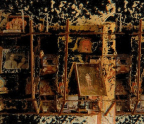Soft Blues

“The past does not influence me; I influence it.”
— Willem de Kooning
“Know amazedly how often one takes his madness into his own hands and keeps it.”
— Lorine Niedecker
The best thing I got from my relationship with Z was his description of Alvarado Street in Los Angeles being like a river, how the traffic just swims down it.
The second best thing I got was that I was finally disabused of the idea that de Kooning was a genius. Z, a straight cis white boy painter from Texas, without one lick of irony or self-awareness at how ironic it made him look, worshipped de Kooning, idolized and wanted to be him, studied him with righteous devotion, hunted every scrap of biographical anecdote; de Kooning did it like this, de Kooning said this, repeating quotes like the rosary, which was all a big yearning, a hope that, in small ways that were accumulating, through will and determination but also osmosis, by soaking himself in the sticky wet of de Kooning’s everything, Z was comporting himself more and more toward de Kooning, and would one day walk in the shadow that would also be the light of the master.
It’s the kind of behaviour that straight cis white boys are born into, the kind propelled by something that commingles faith and delusion, faith in themselves and their god-given right to be front and centre and always on top, and the ability to ignore completely the possibility that everything they believe to be true about themselves is a delusion. True, it’s a delusion that the whole world believes in, but doesn’t that fact only corroborate its being a lie?
The German word literally means “painter pig,” but it is figuratively used to describe an archetypal male artist: chauvinistic; lauded; insecure and emotionally irresponsible; egomaniacal but allowed, even urged, to be that way; misogynistic in his art and life, despite that both of those things could not have happened without the wives, mothers, sisters, and girlfriends who serve him in the capacity of collaborators, advocates, patrons, managers, curators, editors, critics, teachers, therapists, caregivers, mentors, librarians, accountants, assistants, cooks, maids, muses, typists, secretaries, publicists, laundresses, and nurses. No matter his medium, the is a genius of a singular kind, a trailblazer who, in a divinely directed quest à la Moses, ventures to the wild frontier of his craft, spelunks depths that he presumes—and which the world substantiates back to him—have never before been excavated, or if
You’re reading a preview, subscribe to read more.
Start your free 30 days





